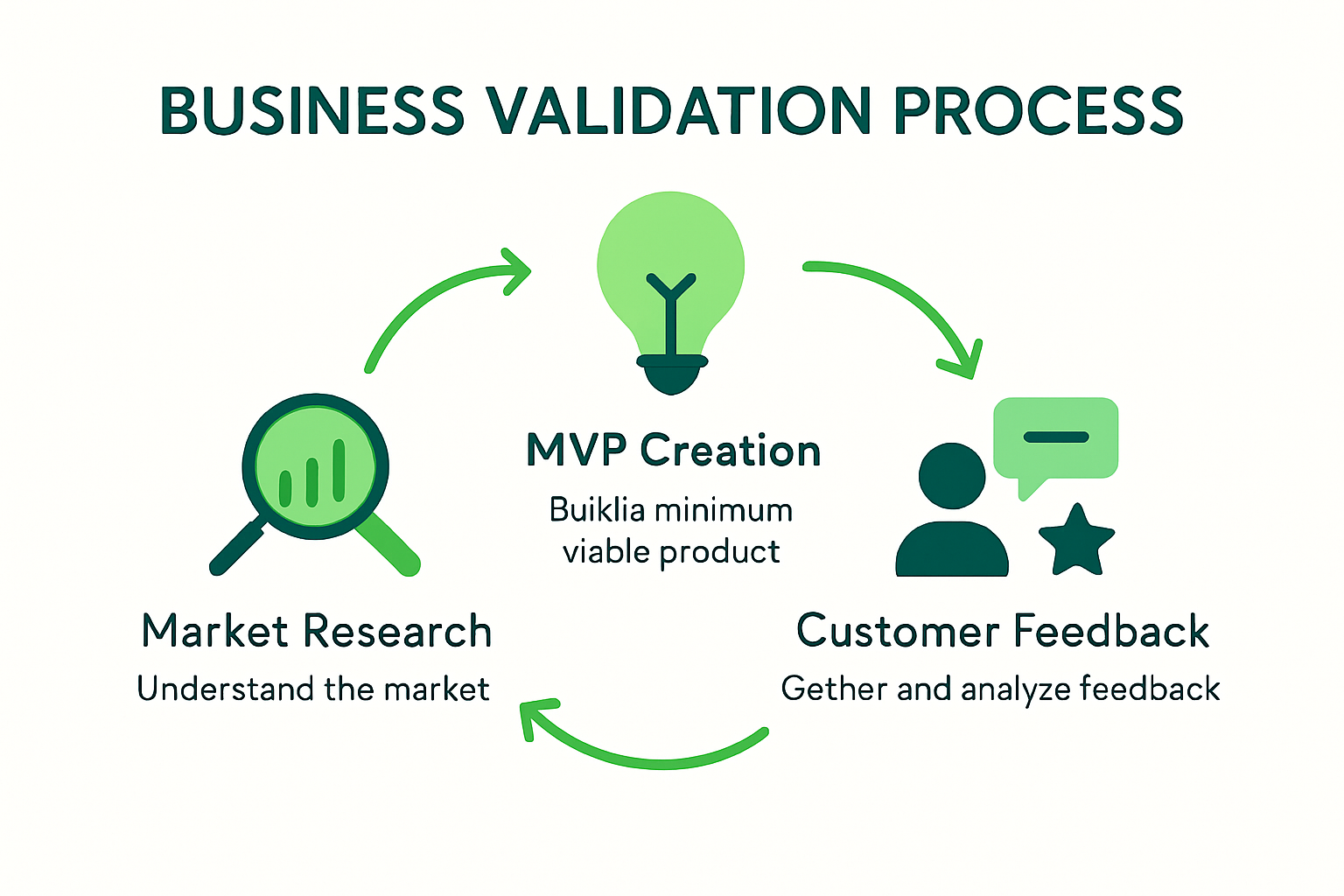
What Is Business Validation? A Simple Guide for New Founders
Every founder dreams of launching the next big thing, yet the stats are eye-opening. Around 90 percent of startups fail, often because they build something nobody actually wants. That sounds scary, but here’s what might surprise you. The real secret is that smart founders do not rely on passion or luck—they use business validation to turn raw ideas into real-world proof.
Table of Contents
- Understanding The Basics Of Business Validation
- Why Business Validation Matters For New Entrepreneurs
- Key Components Of Effective Business Validation
- Why Business Validation Matters For Beginners
- The High Cost Of Skipping Validation
- Building Confidence Through Systematic Validation
- Easy Steps To Validate Your Business Idea
- Conduct Comprehensive Market Research
- Build And Test Your Minimum Viable Product (MVP)
- Financial And Competitive Validation
- Common Mistakes And How To Avoid Them
- Misunderstanding Customer Needs
- Technical And Product Development Challenges
- Overlooking Continuous Validation
Quick Summary
Understanding the Basics of Business Validation
Business validation is the critical process of testing and confirming whether a business idea has genuine market potential before investing significant time and resources. At its core, this strategic approach helps founders minimize risk and increase their chances of creating a successful venture.
Why Business Validation Matters for New Entrepreneurs
Starting a business is like navigating uncharted waters. According to the U.S. Small Business Administration, business validation involves conducting thorough market research and competitive analysis to determine if there is a viable demand for your product or service. This isn’t just a theoretical exercise it’s a practical necessity for survival.
Founders who skip validation often find themselves investing months or years into ideas that ultimately have no real market fit. Academic research highlights that successful business validation requires systematic hypothesis testing, feasibility analysis, and early customer engagement. It’s about transforming your passionate idea into a data-driven strategy.
Key Components of Effective Business Validation
Validation isn’t a single step but a comprehensive process with multiple critical components. First, you need to identify your target market and understand their specific pain points. This means going beyond assumptions and collecting real evidence about customer needs. Conduct surveys, interviews, and prototype testing to gather genuine insights.
Second, assess the competitive landscape. Who else is solving similar problems? What makes your approach unique? Competitive analysis helps you refine your value proposition and identify potential market gaps. Learn more about developing a strong business concept.
Third, create a minimum viable product (MVP) that allows you to test your core assumptions with minimal investment. An MVP lets you gather real-world feedback quickly and cost-effectively. This approach reduces financial risk while providing invaluable insights into potential market reception.
Remember, business validation is not about proving your idea is perfect. It’s about understanding its genuine potential and being willing to adapt based on real evidence. Successful founders view validation as an ongoing process of learning and refinement, not a one-time checkbox to complete.
Why Business Validation Matters for Beginners
For new entrepreneurs, business validation is more than a strategic step it’s a critical survival mechanism that transforms passionate ideas into sustainable ventures. Without proper validation, founders risk investing time, money, and energy into concepts that might never gain traction in the real world.
The High Cost of Skipping Validation
Starting a business is inherently risky. According to Harvard Business School Online, market validation is crucial for predicting whether people will actually buy your product and whether your business will be profitable. The stakes are high: most startups fail not because of poor execution, but because they create something nobody wants.
Statistically, approximately 90% of startups fail, with a significant portion collapsing due to misreading market demand. This isn’t just a number it’s a stark warning for beginners who believe passion alone guarantees success. University of Melbourne research emphasizes that successful entrepreneurs are biased toward action, quickly testing and adapting their ideas based on real-world feedback.
Building Confidence Through Systematic Validation
Validation does more than prevent failure. It builds investor confidence and provides a roadmap for strategic development. Learn how to analyze business opportunities systematically.
According to SpringerLink academic research, validation is a continuous, iterative process essential throughout a startup’s life cycle. It’s not a one-time checkpoint, but an ongoing strategy of learning, adjusting, and refining your business concept.
Key benefits of thorough business validation include:
- Reduced Financial Risk: Minimize wasted resources by testing assumptions early
- Clearer Market Understanding: Gain deep insights into customer needs and preferences
- Enhanced Investor Appeal: Demonstrate thoughtful, data-driven approach to potential supporters
For beginners, validation transforms entrepreneurship from a high-stakes gamble into a calculated, strategic journey. It’s about replacing wishful thinking with evidence-based decision-making. By systematically testing your idea, you’re not just protecting your investment you’re increasing your odds of building a truly successful business.
Easy Steps to Validate Your Business Idea
Validating a business idea isn’t a mystical process but a systematic approach that transforms your entrepreneurial vision into a potential reality. The journey from concept to viable business requires strategic steps that minimize risk and maximize potential success.

To help visualize the main steps in the business validation process, here’s a table summarizing the key actions new founders should take:
Conduct Comprehensive Market Research
Market research is the foundation of business validation. According to the U.S. Small Business Administration, founders must thoroughly investigate their target market, understand customer needs, and analyze competitive landscapes. This means diving deep beyond surface-level assumptions.
Start by identifying your ideal customer profile. Who exactly will benefit from your product or service? Create detailed personas that go beyond demographics to understand psychological motivations, pain points, and purchasing behaviors. Conduct surveys, interviews, and focus groups to gather genuine insights. Learn more about developing a robust business validation strategy.
Build and Test Your Minimum Viable Product (MVP)
An MVP is not a fully developed product but a basic version that allows you to test core hypotheses with minimal investment. This approach lets you gather real-world feedback quickly and cost-effectively. Your MVP should solve the primary problem your target market experiences while remaining simple and focused.
Key steps in creating an effective MVP include:
- Prototype Development: Create a basic version that demonstrates your core value proposition
- User Testing: Collect feedback from potential customers through structured trials
- Iteration: Rapidly adapt your concept based on genuine user insights
Financial and Competitive Validation
Beyond customer research, validate your idea’s financial feasibility. Calculate potential revenue streams, understand your cost structure, and assess market size. Research competitors to identify unique selling propositions that differentiate your offering.
Analyze existing solutions in your market. What gaps exist? How can your product provide superior value? This competitive analysis helps refine your business concept and positioning.

Remember, business validation is an ongoing process. Successful entrepreneurs remain flexible, continuously learning and adapting their ideas based on real-world evidence. Your initial concept will likely look different from your final product and that’s perfectly normal. The goal is progress, not perfection.
Common Mistakes and How to Avoid Them
Business validation is a critical process, but many new founders stumble into predictable traps that can derail their entrepreneurial journey. Understanding these common mistakes can help you navigate the challenging landscape of startup development more effectively.
Below is a comparison table outlining the most common validation mistakes and practical strategies to avoid them, helping founders steer clear of these pitfalls:
Misunderstanding Customer Needs
One of the most significant errors founders make is assuming they know exactly what customers want without proper validation. Forbes research highlights that insufficient market differentiation and poorly communicated value propositions are key reasons businesses fail.
To avoid this pitfall, conduct extensive customer interviews that go beyond surface-level questions. Startup Commons suggests delving deeper into customer problems, understanding the time and money they currently spend trying to solve these issues. This approach transforms customer interviews from mere research into potential sales opportunities.
Technical and Product Development Challenges
Contrary to popular belief, business failures aren’t always about market demand. Academic research from a comprehensive study reveals that technical inadequacies can significantly impact startup success. The study identified three critical engineering-related issues:
- Product Uncertainty: Weak requirements engineering leading to misaligned product development
- Quality Concerns: Poor product quality that fails to meet market expectations
- Team Dynamics: Potential team breakups that disrupt product creation
Overlooking Continuous Validation
Validation isn’t a one-time event but an ongoing process. Many founders make the mistake of validating their idea once and considering the job done. In reality, markets evolve, customer needs change, and your business must adapt continuously.
This means regularly reassessing your:
- Market Positioning: How your offering compares to current competitive landscape
- Customer Feedback: Ongoing insights from actual users
- Business Model: Potential pivots or refinements based on real-world performance
Explore strategies for sustained business validation to ensure your startup remains agile and responsive.
The most successful entrepreneurs view mistakes not as failures but as learning opportunities. By anticipating these common pitfalls and maintaining a flexible, data-driven approach, you can significantly increase your chances of building a sustainable and successful business. Remember, validation is less about proving you’re right and more about understanding where you might be wrong.
Frequently Asked Questions
What is business validation?
Business validation is the process of testing and confirming whether a business idea has genuine market potential before heavily investing time and resources. It involves thorough market research, customer feedback, and competitive analysis.
Why is business validation important for new entrepreneurs?
Business validation helps new entrepreneurs minimize risk by ensuring their ideas have a viable market fit. It prevents the investment of time and money into concepts that may not resonate with target customers and supports more informed decision-making.
What are the key components of effective business validation?
Key components of effective business validation include identifying your target market, understanding customer pain points, assessing the competitive landscape, creating a minimum viable product (MVP), and engaging in continuous customer feedback and iteration.
How can founders avoid common mistakes in business validation?
Founders can avoid common mistakes by conducting thorough customer interviews to understand needs, focusing on clear product requirements to avoid technical challenges, and treating validation as an ongoing process rather than a one-time task.
Ready to Make Your Business Idea Real? Start Validating with Confidence
You have just learned how critical business validation is for transforming your idea into a startup that actually solves real customer problems. The article shows that skipping proper validation leads many founders to wasted resources and lost opportunities. Does building a data-backed business sound tough or uncertain? That is exactly where most new founders stumble. It is easy to get stuck on second-guessing what steps to take, how to get honest feedback, or which risks to tackle first.
Let siift be your personal guide. Our intuitive AI gives you the structure missing from most DIY validation efforts. Get tailored insights, step-by-step feedback, and smart actions that help you avoid those common mistakes discussed earlier. Do not wait to find out if your customers will care. Join siift now and turn your business vision into real-world traction. For a practical way to begin validating your ideas today, explore how siift can make your next step easier and smarter with our founder’s journey toolkit.
Recommended
- blog | siift | How to Validate Idea in 2025: A Simple Guide for New Founders
- blog | siift | Business Opportunity Analysis for First-Time Founders 2025
- blog | siift | How to Find Business Ideas in 2025: Proven Steps for Students and New Grads
- blog | siift | What Is Business Risk? A Simple Guide for New Entrepreneurs 2025
- Mastering Product Validation: Strategies, Process, and Best Practices for Market Success
- Le 5 caratteristiche di una Start-up Vincente » strategiavincente.it

see where you really stand





.svg)
.svg.png)



.svg)

